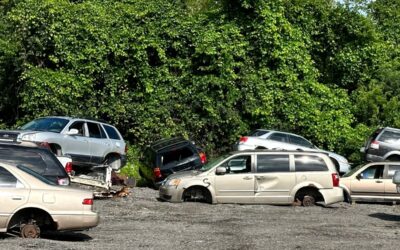Introduction
Old tires can quickly pile up in garages, backyards, and auto shops. But simply throwing them away is neither safe nor responsible. Tires are large, non-biodegradable, and can be detrimental to the environment if not disposed of properly. Whether you’re a car owner, mechanic, or tire recycler in Ontario, it’s important to know how to properly dispose of used tires.
Proper disposal will keep your property clean, protect the environment, and support recycling efforts across Ontario. Read on for safe, legal, and eco-friendly ways to recycle and dispose of old tires in Ontario.
Why You Should Never Burn or Illegally Dump Tires
Burning tires releases harmful pollutants such as benzene, chlorine, sulfur dioxide, and heavy metals into the air. The resulting fumes are toxic to people and animals and damaging to the environment. Even one tire can pollute the air and soil for years if burned. Throwing tires in landfills is illegal in many areas in Ontario and can result in significant fines.
Tires do not biodegrade. When dumped in landfills or abandoned lots, they can collect stagnant water, attracting mosquitoes and other pests. Tires can also be a fire hazard. Ontario strictly prohibits dumping tires, especially near forests or on private property.
Proper disposal isn’t just about cleanliness — it’s about protecting your health and avoiding legal trouble. Always use approved channels to ensure your tires don’t become someone else’s problem.
Understand Ontario’s Tire Recycling Program
Ontario has a regulated tire recycling system that motivates users to get rid of their tires correctly. The system was previously operated by Ontario Tire Stewardship (OTS), but it currently operates under the oversight of the Resource Productivity and Recovery Authority (RPRA). Under this system, tire producers, importers, and sellers must ensure that old tires are collected and recycled properly. Most tire retailers in Ontario operate under this system.
When you purchase new tires, the tire dealer often charges a small disposal fee in the total cost. This fee is used to pick up and properly recycle your old tires, doing so safely for the environment. If you’re changing tires yourself at home or in a small garage, ask your tire seller if they are registered with the RPRA. If they are, you may be able to return your old tires at no extra cost.
Take Them to Registered Tire Collectors
RPRA authorizes registered tire collectors to collect, store, and transport used tires for recycling. Registered collectors can list multiple businesses under their ‘collector’ registration and often include other recycling services, such as batteries or auto parts. You can find a registered tire collector in RPRA’s public directory or follow up with your local mechanic to see if they’re affiliated with a registered collector.
Here’s what to keep in mind:
-
- Call first to ensure the collector accepts residential drop-off.
- Some collectors may limit the number of tires you drop off at a time.
- Many collectors require that tires be clean and separated from the rims.
- These collection centres send the tires to recycling processors who strip and reuse the rubber, steel, and fabric for other industries.
Also Read: What Happens to Used Car Batteries in Canada?
Drop Them at Municipal Recycling Centres
In many cities and towns across Ontario, old tires can be returned to a local waste or recycling centre. Generally, they can be dropped off at reasonable operating hours. These places are good options for households. They’re a legal and convenient option for consumers to dispose of old tires responsibly.
Rules will vary by region. For example, in Toronto, while tires can be disposed of through a Community Environment Day or city drop-off depot, they do not accept tires through curbside pickup as waste. If you live in a smaller municipality, call your local public works department or check their website to see:
-
- How many tires they accept per drop-off
- If proof of residency is required
- Whether tires with rims are accepted
Consider Tire Retailers and Auto Repair Shops
If you are replacing your tires at a shop, it is a good idea to ask them if they offer tire recycling. Most tire retailers will take your old set and recycle it as part of the replacement. This is the easiest option for the average commuter.
Many independent repair shops offer similar options. If they can’t recycle your tires, they may refer you to a registered recycler or collector.
You can also ask your dealership or mechanic if they have buyback programs for tires or seasonal return programs in the spring or fall during changeovers. Some of these events may even offer free recycling or discounts on future service work.
Use a Tire Recycling Pickup Service
If you have tires piling up and no way to transport them to a collection point, consider using a tire pickup service. Some recyclers that are based out of Ontario will come to your home or business for a small service fee, which works well for the following situations:
-
- Farmers or rural property owners with large piles of tires
- Your mechanic where they have many tires from customer vehicles
- Homeowners who don’t have a way to transport them to a drop-off location
These can easily be found online or through the RPRA directory. Always look for a licensed service provider to ensure that your used tires are not being dumped illegally and/or disposed of improperly or unsafely.
Creative Reuse Isn’t Always the Best Option
While repurposing old tires into swings, garden planters, or fitness equipment may seem clever and eco-friendly, they can still break down and release chemicals over time. Paint may also chip, and tires in extreme heat can crack and leak oils.
If you plan to reuse tires creatively, do so with caution. Limit the amount you use in outdoor spaces and especially edible gardens, or near water sources. Never bury tires or use them in permanent structures unless you’ve thoroughly researched the safety risks.
Also Read: How to Buy Used Auto Parts Safely in Ontario | Complete Guide
What Happens to Recycled Tires in Ontario?
Recycled tires in Ontario have many uses. Tire recycling facilities separate them into components like rubber, steel, and nylon. These materials are then turned into new products like:
-
- Playground surfaces
- Rubber mats
- Sports fields
- Asphalt additives
- Garden mulch
- Industrial flooring
Recycling keeps the material in use while reducing demand for raw rubber, oil, and other resources. It also creates jobs and reduces landfill pressure across the province.
Final Thoughts
If you’d like to recycle your vehicle or vehicle parts, Greenway Auto Recycling is here to help you. We provide trusted scrap car pickup services throughout Ontario. We do all the work, including pickup to disposal! We also recycle your old tires properly, and we can help you with your license plates, returning them and instructing you on how to close your registration to finish your process.
You won’t have to worry about where to store old tires in your garage or what to do next. Just call us at (416) 783-9026, and we will do it all for you. We ensure your vehicle and parts — including tires — are recycled through legal and eco-friendly channels. It’s quick, easy, and worry-free.





